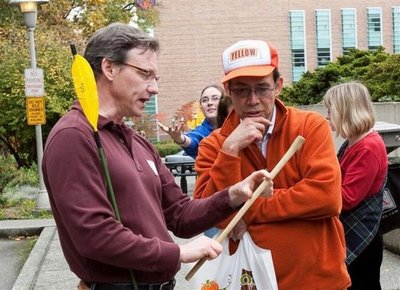October 14, 2010
How did humans live 12,000 years ago? Find out at Ice Age Archaeology Day
The Burke Museum presents a day of exhibits and talks on what life was like during the coldest time the state has ever known – the last Ice Age. On Sunday, Oct. 17, Burke archaeologists and other specialists will share the inside scoop on human life 12,000 years ago. This event will feature a mix of family-friendly activities and presentations from practicing archaeologists.
Schedule of events:
All day – Try your hand at the ancient skill of attaching a spear point to a shaft (hafting); see and touch fossils of the giant animals who shared the earth with people during the Ice Age; participate in an interactive exhibit about the earliest archaeological sites in Washington State; talk to archaeologists about what they do and how they help us understand our past.
11 a.m. – “Prehistoric Life in a Cold World,” with UW archaeology graduate student Colby Phillips. How did ancient peoples adapt to life in cold climates? Phillips will discuss his own research and field work on the Kuril Islands, a remote volcanic archipelago between Russia and Japan in the North Pacific Ocean.
12:30 p.m. – “Stories from Then and Now,” with storyteller Roger Fernandes. Fernandes, a member of the Lower Elwha Band of Klallam Indians, will share mythic stories from the first peoples of Puget Sound. He will compare phenomena mentioned in the stories with current scientific observations.
2 p.m. – “Imaginations of the Pleistocene on Film: What is Real and How do we Know?” with UW graduate student Aaron Naumann. What does Hollywood get right (and wrong) when portraying early human life on the big screen? Naumann will present an overview of movies about the Pleistocene like Ice Age and 10,000 B.C. He will also discuss how archaeologists use scientific evidence to create their own scenarios of human interactions with the environment during the last glacial period.
Parents and teachers are invited to take home educational materials on the subject of archaeology, provided by the Burke Museum.

